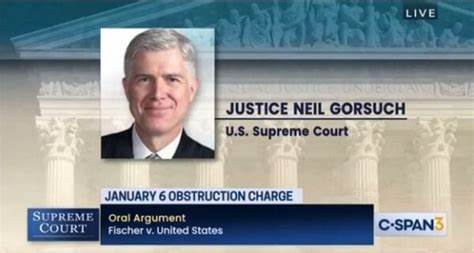Politics
AUDIO: Justice Gorsuch Grills Biden DOJ Over Extreme January 6 Sentences

Supreme Court Justice Neil Gorsuch grilled Solicitor General Elizabeth Prelogar over the extreme prison sentences handed down to January 6 defendants when compared with similarly situated left-wing protesters and rioters, the overwhelming majority of whom face slaps on the wrist if they face any accountability at all.
The court is currently hearing oral arguments in a case brought forward by former Pennsylvania police officer Joseph Fischer, one of several hundred January 6 defendants charged with an obscure felony for “obstruction of an official proceeding.” The novel legal theory draws from the Enron corruption scandal and has been exclusively deployed against January 6 defendants.
While January 6 defendants are charged with the felony statute, in addition to a handful of misdemeanors, the vast majority of left-wing protesters are not even charged when engaging in similar conduct. There has been no four-year manhunt to hunt down trespassers from the 2020 riots — thousands of whom trespassed on federal property — nor has the DOJ hunted pro-Palestine protesters who have stormed the White House, abortion protesters, far-left militants who attacked federal courthouses in 2020, and thousands of other left-wing protesters who have occupied federal buildings and obstructed proceedings.
During Wednesday’s arguments, Gorsuch pressed Prelogar over the disparities in sentencing while referencing a number of examples, including the protests against Justice Brett Kavanaugh’s nomination. “Would a sit-in that disrupts a trial or access to a federal courthouse qualify? Would a heckler in today’s audience qualify or at the State of the Union address?” Gorsuch questioned.
“Would pulling a fire alarm before a vote qualify for 20 years in federal prison?” he continued, referencing the incident where Rep. Jamaal Bowman (D-NY) pulled a fire alarm and caused Congress to pause a vote. Bowman was given a slap on the wrist where he avoided jail time and was merely required to write an apology essay about his actions.
Prelogar responded by referring to real world examples cited by Gorsuch as “hypotheticals.” She went on to state that proving intent is a key aspect of the statute and insinuated that malicious intent was evident in the case of Trump supporters on January 6, though this is not the case with “minor disruptions” from left-wing protesters. “So that means that if you have some minor disruption or delay or some minimal outburst, we don’t think it falls within the actus reus to begin with,” she said.
“My outbursts require the court to reconvene after the proceeding has been brought back into line, or the pulling of the fire alarm, the vote has to be rescheduled, or the protest outside of a courthouse makes it inaccessible for a period of time. Are those all federal felonies subject to 20 years in prison?” Gorsuch followed up.
“So, with some of them it would be necessary to show nexus. So with respect to the protest outside the courthouse, we’d have to show that yes, they were aiming at proceeding,” she continued, prompting Gorsuch to point out that they clearly were attempting to halt the proceeding.
“Yes, and then we’d also have to be able to prove that they acted corruptly and this sets a stringent mens rea. It’s not even just the mere intent to obstruct. We have to show that also, but we have to show that they had corrupt intent in acting in that way,” she continued. “But I guess what I would say is that to the extent that your hypotheticals are pressing on the idea of a peaceful protest, even one that’s quite disruptive, it’s not clear to me that the government would be able to show that each of those protesters had corrupt intent.”
Supreme Court Justice Gorsuch nukes Joe Biden's DOJ over January 6th sentences:
Gorsuch lists multiple cases of folks who "obstructed a Congressional proceeding" without receiving a 20 year sentence.
1. Sit-ins at a trial (Kavanaugh protests)
2. Pulling a fire alarm (Rep.… pic.twitter.com/DWETkzi7JI— End Wokeness (@EndWokeness) April 16, 2024
To date, the Biden DOJ has charged more than 1,400 Americans in connection with the January 6 Capitol protests. The nationwide hunt continues to this day, nearly four hours after the minor riot. Hundreds of defendants have been sentenced to months or even years in prison for non-violent conduct, with 64 percent of those convicted sentenced to prison.

